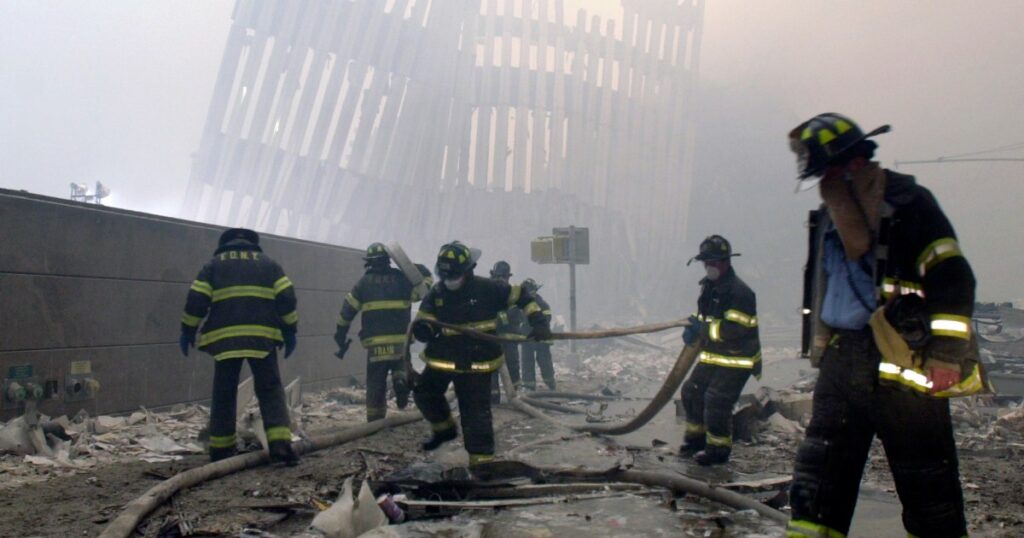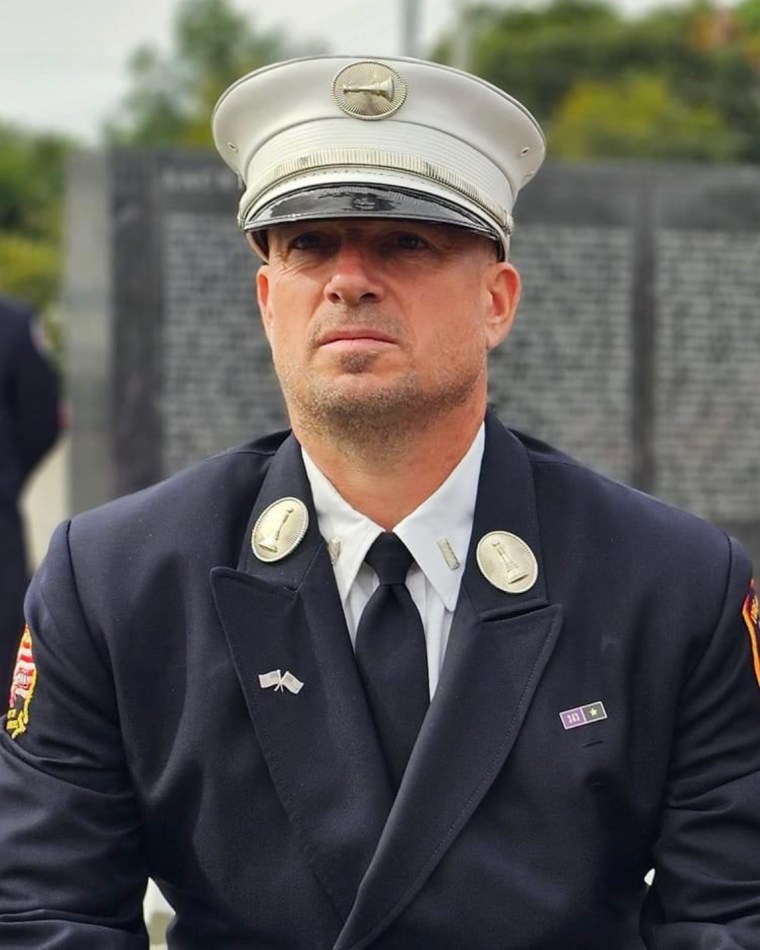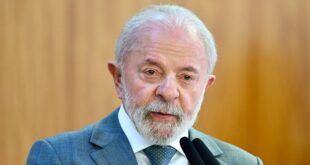
More than 23 years after the Twin Towers collapsed, blanketing lower Manhattan in toxic dust and debris, the number of people diagnosed with 9/11-related illnesses is still growing.
Since 2011, the main resource for people exposed to the fumes has been the World Trade Center Health Program, which covers treatment for cancer, asthma and post-traumatic stress disorder, among other health conditions.
Of the roughly 132,000 people enrolled in the program as of December, 64% have at least one condition linked to 9/11. Cancer is the most common, affecting more than 40,000 members. Some people join the program after an illness has developed, while others join to receive annual screenings that could detect illnesses in the future.
The program’s fate has seesawed over the past 10 weeks as the Trump administration fired and rehired certain staffers, only to terminate them again last month, according to lawyers and advocates for people with 9/11-related exposures. They added that the staffing cuts have made it harder to enroll members or confirm that their treatment is covered by federal funding.
“These cuts are going to potentially delay treatment, delay diagnosis and early detection of their cancers, and it’s going to cost lives,” said Todd Cleckley, a nurse medical specialist at Barasch & McGarry, a law firm representing 9/11 responders and survivors.
“The health program already operated on a very slim staffing margin,” he added. “We’re only beginning to see what those negative impacts will be.”
Sixteen of the program’s staffers were swept up in the Trump administration’s firing of probationary workers in February. The administration reinstated the positions roughly a week later, following outcry from both Republicans and Democrats in Congress.
Then in late March the Department of Health and Human Services announced it was laying off around 20,000 federal employees. Those layoffs again included 16 staffers at the World Trade Center Health Program, plus the program’s director, according to lawyers and advocates. The director was reinstated on April 5 after more bipartisan opposition, they said, but the staffers were not.
The HHS layoffs were part of a massive restructuring that gutted the agency responsible for the World Trade Center program, the National Institute for Occupational Safety and Health (NIOSH). In addition to the 16 staffers, HHS terminated other institute employees in charge of certifying that patients’ 9/11-related illnesses were eligible for federal funding, lawyers and advocates said.
“They weren’t on the World Trade Center Program payroll, but they did things that are essential to the program running,” said Benjamin Chevat, executive director of 9/11 Health Watch, a nonprofit group that helps ensure people have access to the program’s services.
Lawyers and advocates plan to visit Capitol Hill on Tuesday to ask lawmakers to reinstate staffers. HHS did not respond to a request for comment.
New York City Mayor Eric Adams said that his office has reached out to the federal government “about restoring these important resources.”
“New York City is dedicated to providing quality health care to the heroes who responded on 9/11 and the survivors of the most tragic day in America’s history,” Adams said in a statement. “Our partnership with the federal government to deliver these services is vital, providing access to life-saving, time-sensitive treatment for every firefighter, police officer, volunteer, and everyday New Yorkers who remember that day, and remember what it took to rebuild the next morning.”
Before the staffing cuts, 9/11 responders and people who lived, worked or attended school or day care in the disaster area could apply to join the program and typically get accepted within a few weeks. But Chevat said no one has been enrolled since April 1. The program usually enrolls around 200 people per month, on average.
Michael Barasch, a partner at Barasch & McGarry, said he’s still submitting applications on behalf of his clients, but “they’re not hearing from the health program, so we don’t know if or when they will ever get an appointment.”
Members of the program receive annual screenings at certified health clinics, which are largely concentrated in the New York area. There, doctors evaluate people for a host of mental and physical illnesses with known ties to 9/11. If a doctor determines there’s a link, the clinic submits paperwork to federal employees, who must certify that the condition is eligible for funding before patients can be treated at no cost. More than 8,200 cancer diagnoses were certified last year.
New certifications haven’t been issued since the start of April, shortly after HHS announced it was dismantling NIOSH, Chevat said.
The delays could have dire consequences for people who were exposed to toxic dust and debris, lawyers and advocates said. Many cancers — once identified — must be treated right away.
“You’ll never hear me say something inflammatory just to make a headline, but it is a fact: People will die because of these decisions,” Barasch said.
The collapse of the Twin Towers released cancer-causing chemicals such as asbestos, benzene and dioxins that lingered in the air for days to weeks. A 10-year study found an elevated risk of leukemia and prostate and thyroid cancers among rescue and recovery workers who responded to the disaster. Other cancers, such as lung cancer and mesothelioma, may develop decades after exposure to asbestos, so future diagnoses are expected.

“We were breathing in glass and asbestos and everything else that you could imagine,” said Michael O’Connell, who assisted with search-and-rescue operations as an early-career firefighter after 9/11. “We slept in it, we ate in it, we bled in it. We didn’t leave it. We were in that zone for almost nine months.”
Roughly six years later, O’Connell was diagnosed with a rare inflammatory disease called sarcoidosis that caused debilitating pain in his joints and skin. He received treatment through the World Trade Center Health Program, which he credits for helping him manage his symptoms. The idea that new members might not be able to enroll or receive treatment is “deeply disturbing,” he said.
If the NIOSH staffers aren’t reinstated, lawyers and advocates said, hospitals may not get reimbursed for chemotherapy or surgeries and eventually may stop offering them to patients. Barasch said he has already received calls from clients worried about whether they can continue to get chemo.
‘“It’s bureaucratic cruelty,” he said. “They’re trying to save money, which is fine, but don’t do it on the backs of the 9/11 community.”
Mariama James, a lower Manhattan resident who was pregnant with her third child during 9/11, said she has been waiting to see if the program will cover a treatment for her sleep apnea. She now expects that process to be delayed.
“How are they going to get a new medication covered if the doctors from NIOSH have been fired?” James said. “I’ll be waiting forever for that medication.”
The World Trade Center Health Program was already vulnerable before the layoffs due to budgetary constraints, Barasch added. In December, Congress opted not to include a long-term funding package for the program in a bipartisan spending deal. Several lawmakers anticipate that the budget shortfall could force the program to close enrollment or scale back treatment for current members starting in October 2028. A bipartisan bill introduced in the Senate in February calls for more funding to be made available until the program expires in 2090.
In addition to lobbying for program staffers to be rehired, lawyers and advocates will ask legislators on Tuesday to back the bill.
 Latest World Breaking News Online News Portal
Latest World Breaking News Online News Portal






